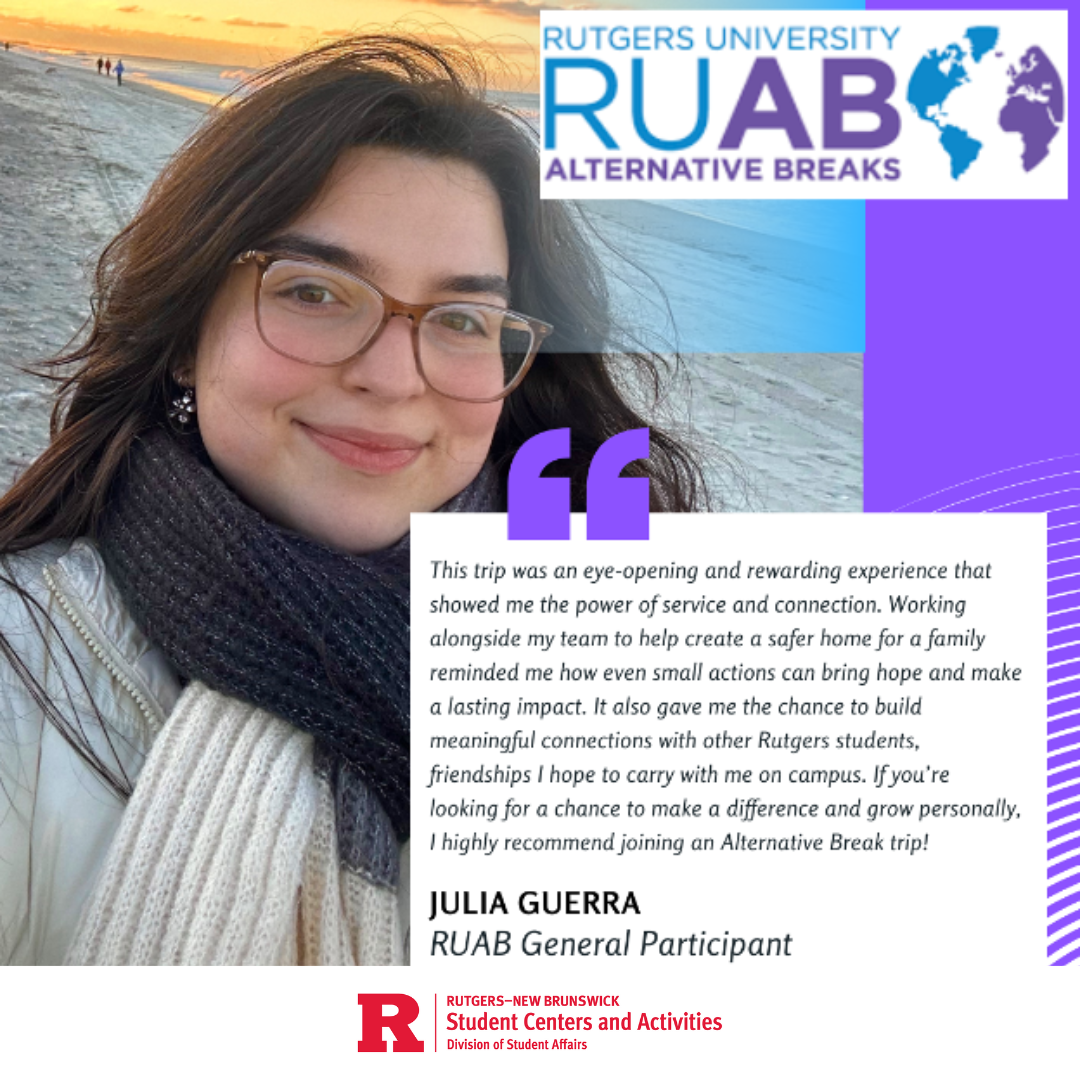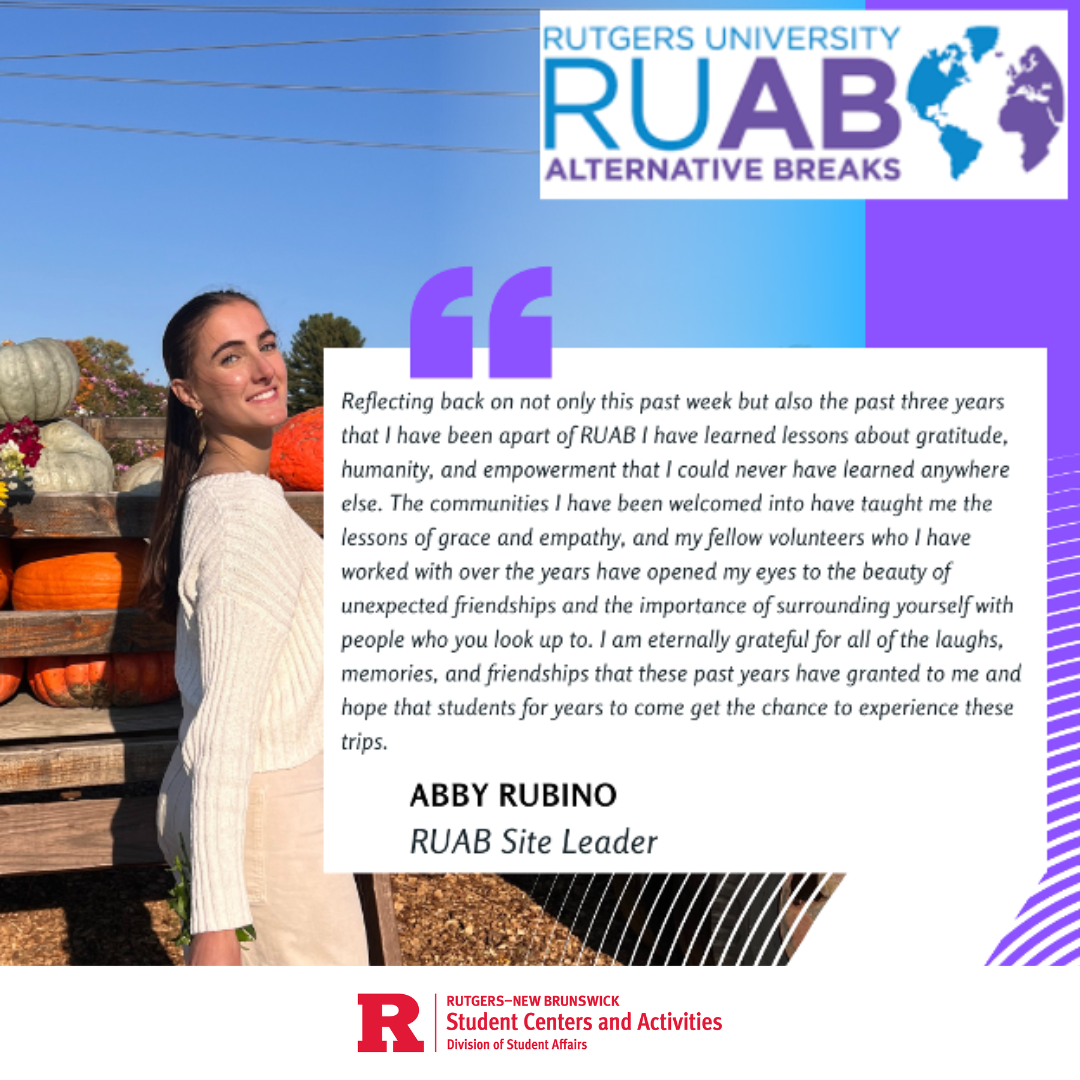Rutgers University Alternative Breaks (RUAB) programs provide undergraduate students with a life-changing opportunity: a semester-long experience centered on community service. Participants learn about social justice issues within the United States and leadership during five weeks of pre-trip meetings, followed by a volunteer excursion during winter or spring break. RUAB as a program aligns with the Academic Master Plan, specifically Pillar IV: Community Engagement, and serves as a high-impact practice. Community-based learning enables participants to develop community partnerships, engage in experiential learning, and foster meaningful relationships with peers and volunteer guides. Participants gain a deeper understanding of servant leadership, positive social change, and cultural humility.
On-site during the break excursion, students provide necessary services and explore the culture and the history of the area. Students who participate in this program develop social responsibility, leadership skills, and a lifelong learning mindset, thereby fostering a generation of leaders committed to positive social change. This program is sponsored by Student Centers and Activities, Rutgers University Alternative Breaks, and the Division of Student Affairs.
Rutgers University Alternative Breaks aims to provide Rutgers University students with an opportunity to:
- Learn about and critically examine interlinking issues that affect the lives of the residents of the city/area in which they are completing service and the surrounding communities.
- Collaborate with various community partners and organizations to deliver the service.
- Listen to and understand community needs, recognize community strengths, and work with the community in reciprocal community relationships.
- Continue a commitment to community service and social change while building new friendships and alliances.
Last year's team was awarded the Chancellor's Award for Outstanding Service and was featured on the Chancellor's LinkedIn page.
If interested in learning more, contact the Rutgers Alternative Breaks Executive Board at rutgersu.altbreaks@gmail.com
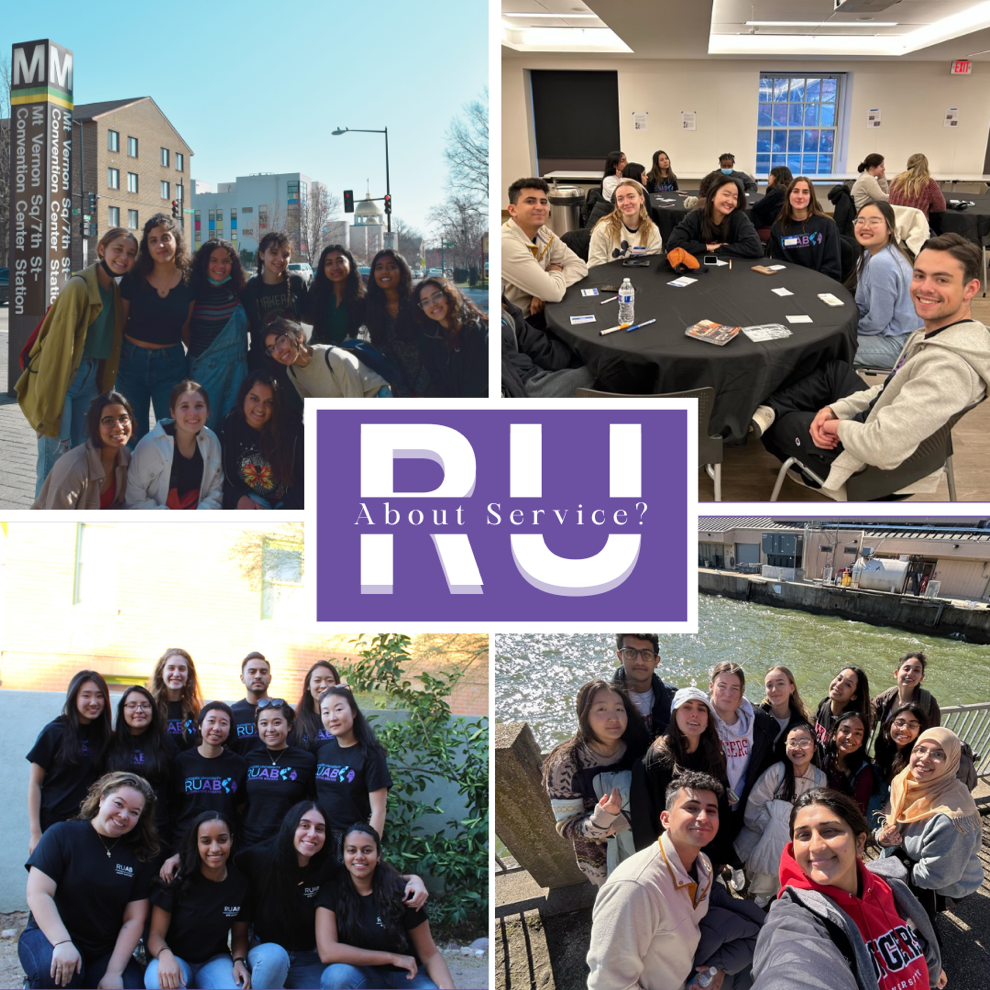 | 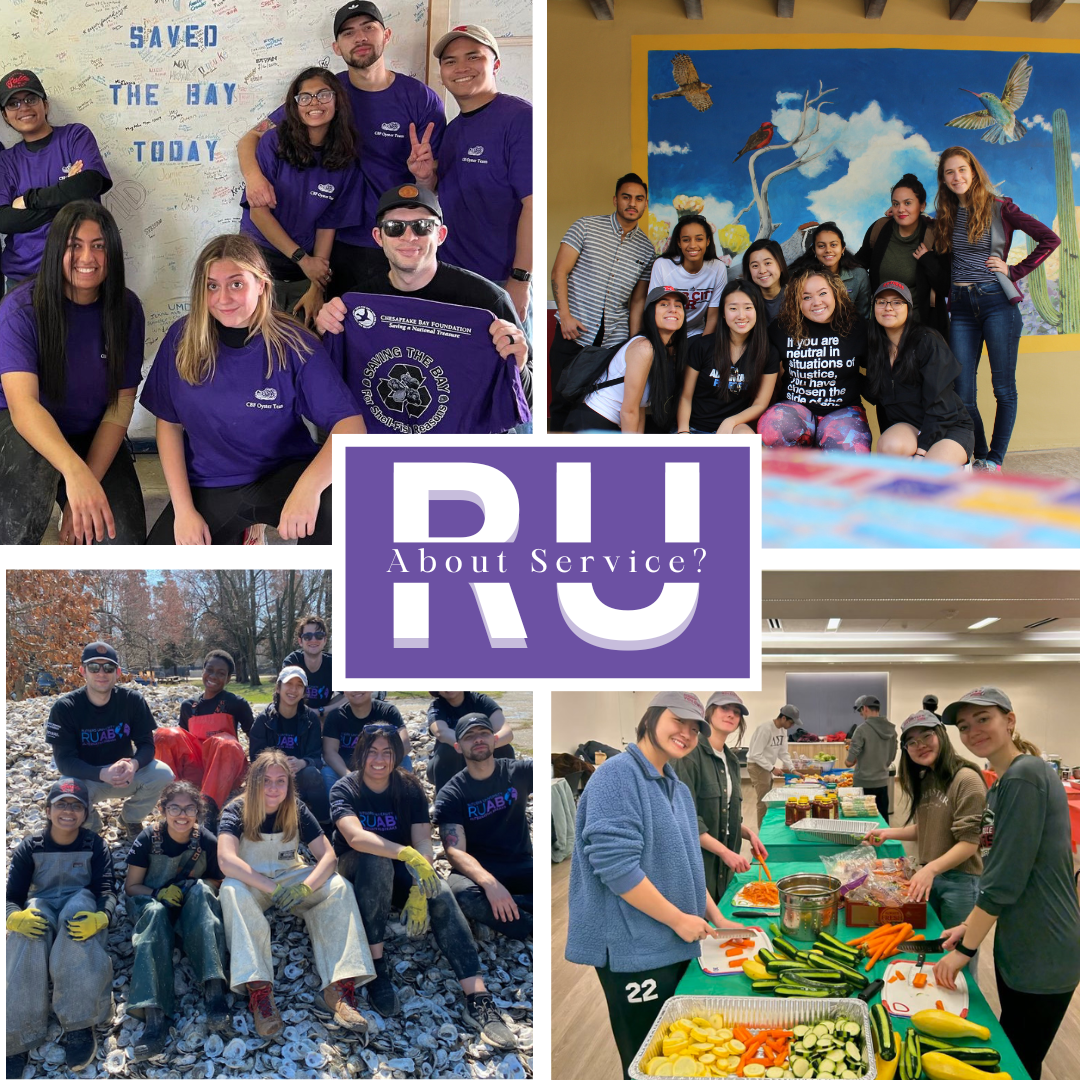 |
2025-2026 Trip Information
2025-2026 Alternative Break Trip Locations
Winter Break 2026
- Wilmington, North Carolina - Sunday, January 4-Sunday, January 11, 2026
- New York, NY - Friday, January 16-Sunday, January 18, 2026
Spring Break 2026
- Boston, Massachusetts - Sunday, March 14-Sunday, March 22, 2026
- Washington, DC (DC Lead) - Sunday, March 14-Sunday, March 22, 2026
2025-2026 Alternative Break Community Focus Areas
- Hunger and Homelessness
- Food Security
- Housing Insecurity/Stability
- Environmental Sustainability
- Poverty
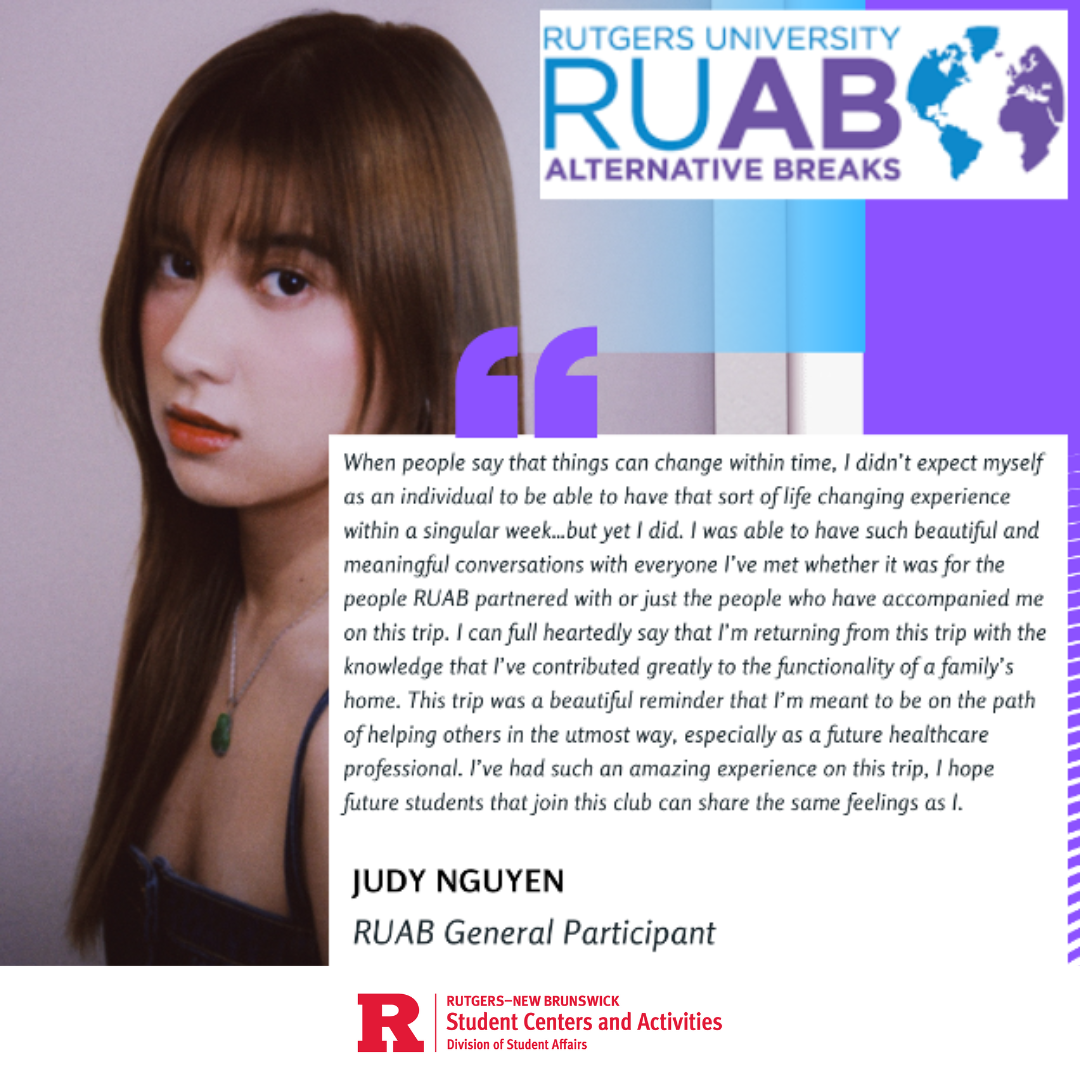
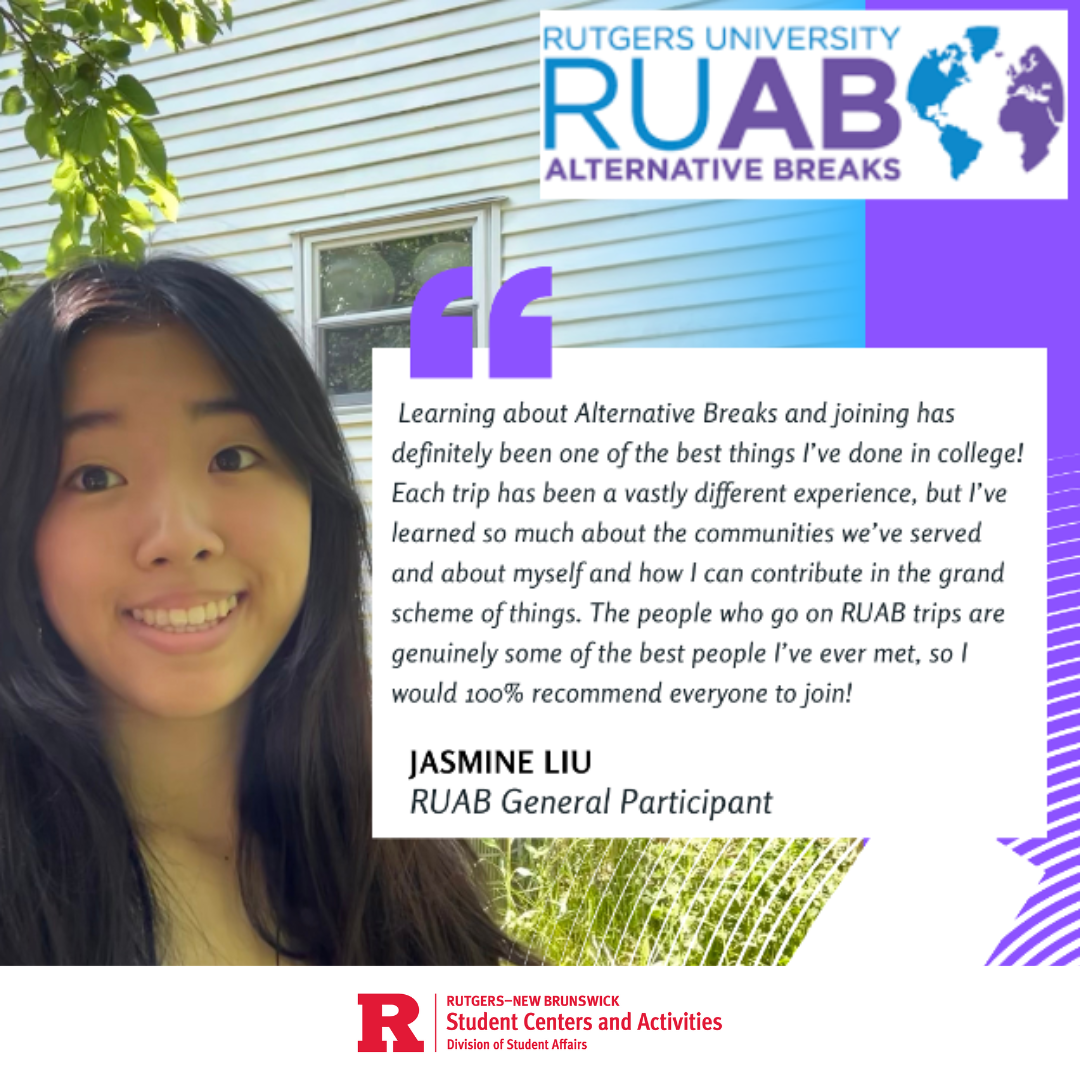
Cost of Trips
All program fees cover travel (by train or airfare), housing, local transportation costs, and required entrance fees. Included meals vary by program and will be listed below.
A non-refundable deposit will be due upon acceptance into the program. Non-refundable deposits are applied to your total program fees; the remaining program fees will be charged to the student's bursar account after the trip.
*Full details and cost will be listed below at a later date. The team is still finalizing the trip details.
2025-2026 Application Process
Want to be on the Alternative Breaks 2025-2026 planning and executive board team? Apply today!
Important Dates for General Applicants:
RUAB Executive Board Application:
- Applications Open: October 1, 2025
- Application Closed: November 10, 2025 at 11:59pm
- Interviews: November 4-18, 2025
- Decision Email: November 22, 2025
- First Payment Due: November 28, 2025
- Mandatory Training and Pre-Trip Meetings (Selected Candidates): TBD
- Mandatory Banquet (Selected Candidates): December 1, 2025; Time: TBD
Executive Board Requirements:
- Be available for all mandatory trainings, meetings, and deadlines
- Maintain professionalism and respect toward all participants, partners, and community members.
- Uphold all Rutgers University policies, including those regarding alcohol, drugs, and harassment.
- Support the mission of community engagement, service, and learning through positive leadership.
- Foster inclusivity and ensure all participants feel valued and safe throughout the experience.
Alternative Break Trips – Staff/Faculty Partners
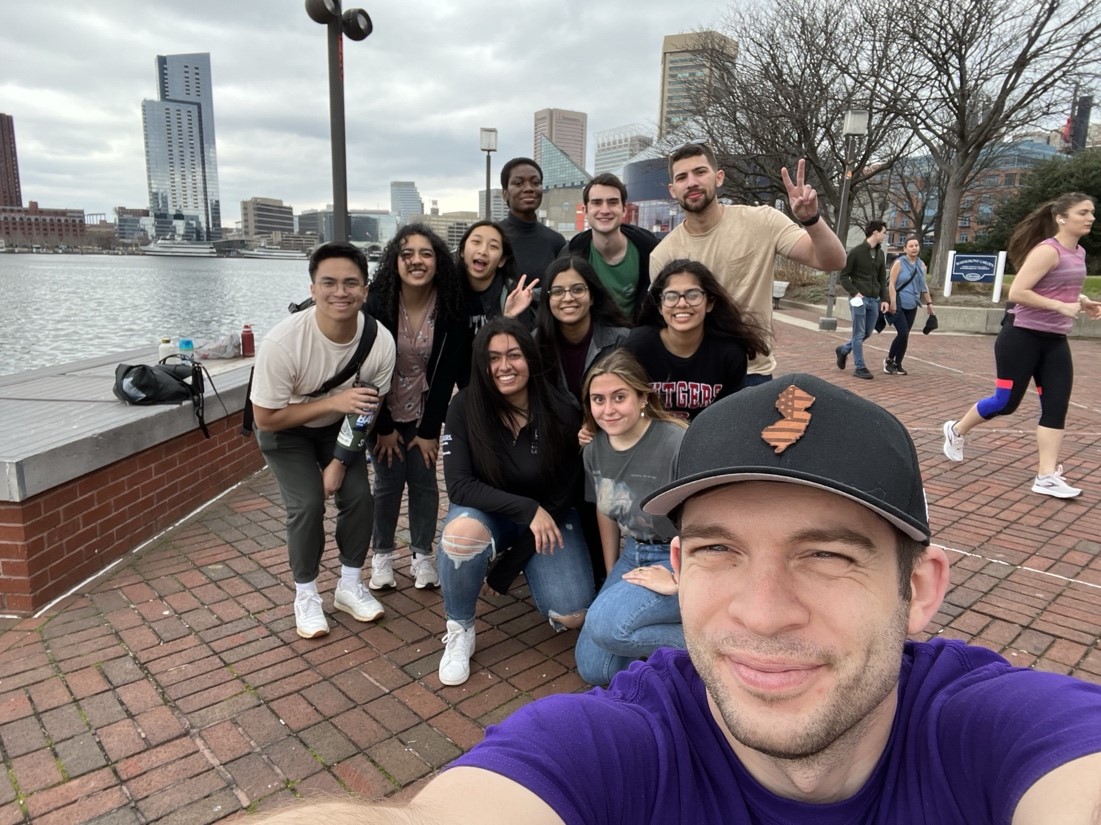 This is a fantastic experience to work with highly motivated and passionate servant leaders who care about supporting our communities. Two undergraduate student Site Leaders will work with a Faculty/Staff Partner in leading a group of ten to twenty students on their trip. This is a very rewarding experience for all who participate. Ideal candidates are passionate about working with students, committed to community service, and have positive, fun attitudes. If accepted, the Faculty/Staff Partner would attend the trip, engage with students, and commit to service with all expenses paid.
This is a fantastic experience to work with highly motivated and passionate servant leaders who care about supporting our communities. Two undergraduate student Site Leaders will work with a Faculty/Staff Partner in leading a group of ten to twenty students on their trip. This is a very rewarding experience for all who participate. Ideal candidates are passionate about working with students, committed to community service, and have positive, fun attitudes. If accepted, the Faculty/Staff Partner would attend the trip, engage with students, and commit to service with all expenses paid.
RUAB Faculty/Staff Application
Important Dates for Faculty/Staff Partner
- Faculty/Staff Partner Application Deadline – Monday, November 24, 11:59 PM ET Apply today!
- Faculty/Staff Partner Speed Interviews – November 24-26
- Decision Letters provided by Sunday, November 30
- Welcome event on December 1, 2025, 7-9pm (Gathering Lounge, Livingston Student Center) This is mandatory for all student participants and selected faculty/staff partners.
- Mandatory Faculty/Staff Partner Training - December 2, 1-3pm, in the Student Activities Center (SAC)
- Pre-Meeting Trips – Dates will be given after Faculty/Staff Partners are paired with their designated trip.
Staff Partner Expectations
- Attend one Faculty/Staff Partner training workshop.
- Attend at least one pre-trip meeting. Pre-trip meetings are pre-determined by Site Leaders prior to participants being selected. Most pre-trip meetings take place on Friday afternoons or Sunday afternoons and evenings.
- Meet one-on-one with Site Leaders at least once prior to the trip so that you can get to know one another and go over expectations for the trip.
- Add educational value to the trip by contributing your life and professional perspective.
- Be a “mature influence” and encourage students to make wise decisions.
- Act as a resource for site leaders by providing advice and/or support.
- Build relationships with site leaders and participants while in a non-traditional role.
- Consult with Student Site Leaders on major decisions affecting the entire group.
- Attend and participate in nightly reflections facilitated by Site Leaders.
- Step in during any emergency situations (i.e. transporting a student to the hospital, advising students during adverse weather conditions, etc.).
- Drive one of the vehicles on the trip and have taken and passed Defensive Driving.
- Attend RUAB events such as the Kickoff Event and the end-of-year celebration.
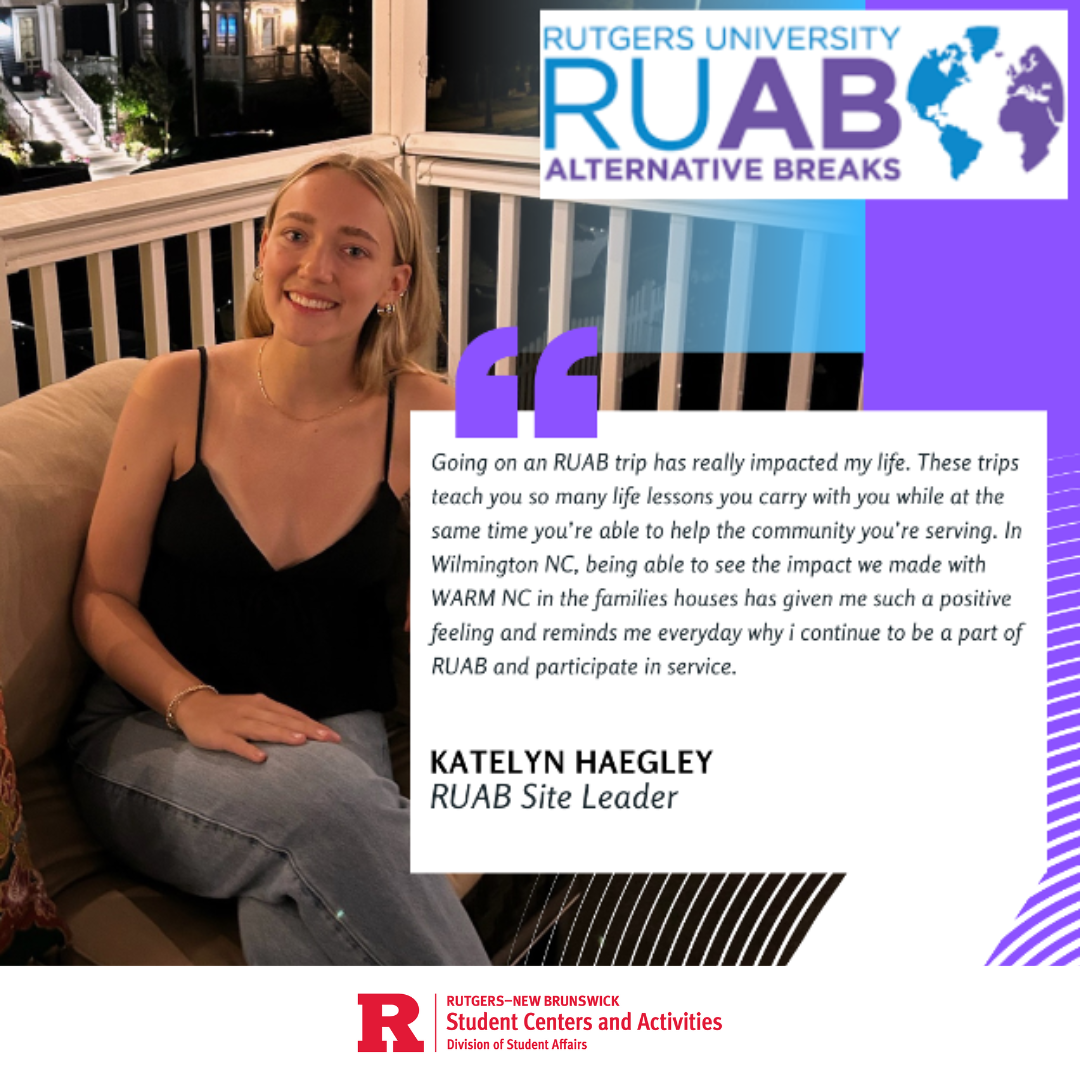
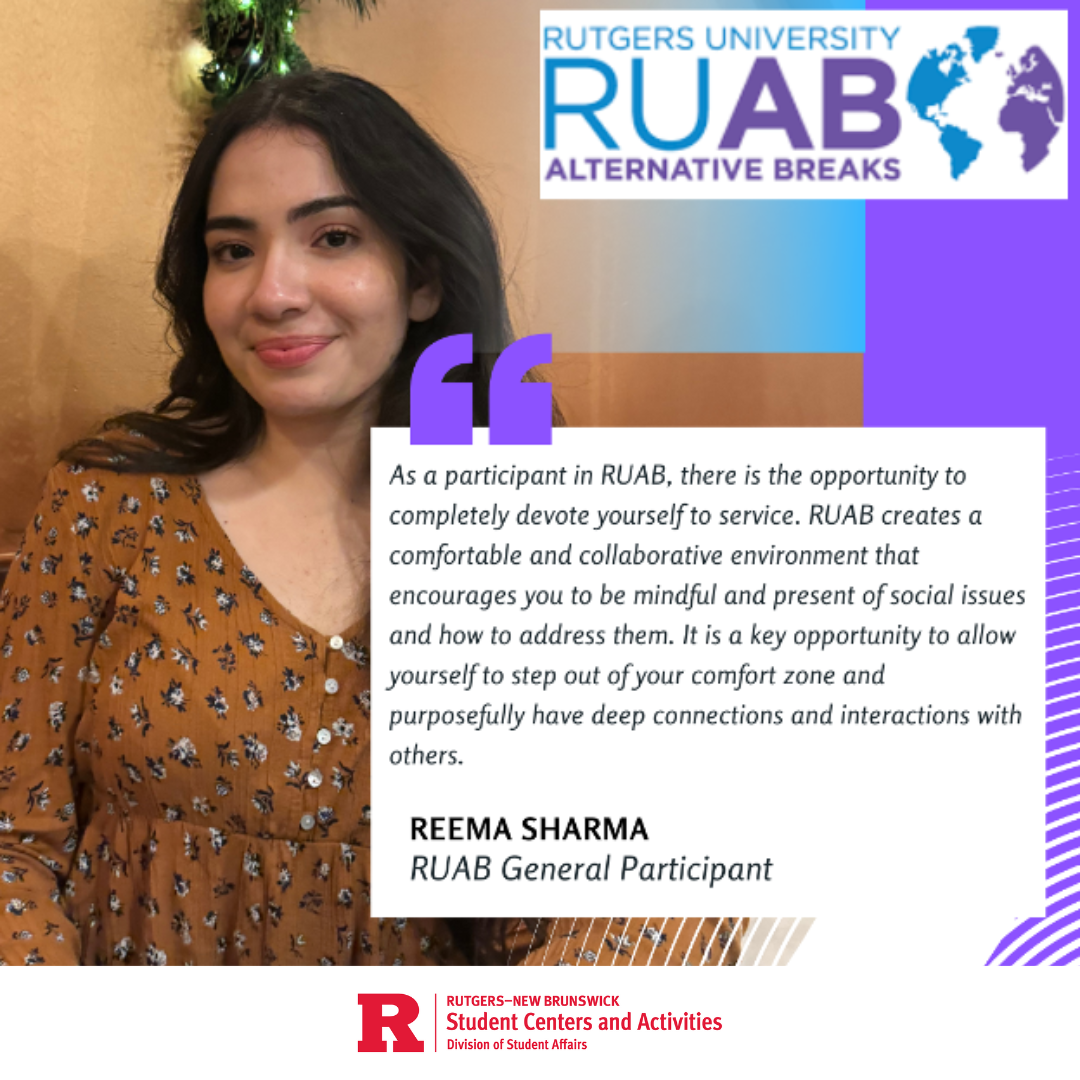
Frequently Asked Questions
The following is a list of commonly asked questions regarding Rutgers University Alternative Break trips. We’ve done our best to list the most common questions, but if you have a question we haven’t answered below, please feel free to email us at treasurer.ruab.intern@gmail.com.
- What is the commitment to be a part of Alternative Breaks?
The commitment for Alternative Breaks consists of four weeks of pre-trip meetings, the trip (all trips are approximately seven days), one post-trip meeting, and one post-trip service project. It is expected that all students will actively participate in fundraising events for the trips as well as their own fundraising. In addition, all students are expected to attend all evening activities while on the trip sponsored by the host site and to remain completely drug and alcohol free the entire time while on the trip.
- What are pre-trip meetings?
Pre-trip meetings are very important in the Alternative Break process. These meetings give students the opportunity to get to know each other and bond prior to the trip. Students learn about the history and culture of the area in pre-trip meetings as well as about the social issues they will be dealing with while volunteering.
- Who participates in the trips?
Rutgers undergraduate students, graduate students, faculty, and staff participate in trips. Each trip has 10 student participants, two student Site Leaders, and one professional staff member who serves as a Staff Partner for the trip.
We also run several specialty trips, including our first-year leadership alternative break. That trip brings 45 participants, eight Site Leaders, and two Staff Partners to Washington, D.C. during Spring Break. To inquire about our first-year specific trip, email Aleena Saleem as3661@scarletmail.rutgers.edu
- Do I have to have prior volunteer experience in order to attend a trip?
Although prior volunteer experience is great, it is not necessary.
- How much are the trips?
Costs vary depending on the trip. However, trips where the group is flying usually cost approximately $550-600.00. Trips where the group is driving usually cost approximately $375-400.00. International trips cost approximately $850-950.00. Students attending trips are fully expected to participate in all Alternative Break fundraising events and to fundraise individually as well.
- Are the sites new every year or do you repeat programs?
Trips are based on a variety of different criteria. New trips are added each year, and we try to offer a diverse set of trips that tackle various social and environmental issues.
- Will I miss class by participating in a trip?
Alternative Break trips are not scheduled while regular classes are meeting. However, they may conflict with some winter session classes.
- What is a group travel experience?
A group travel experience means that decisions will be made in the best interest of the group as whole. In other words, individuals might not get to see all the sights and/or eat at all the places where they would like to. Group travel requires people to cooperate and compromise with others, however, the experience is very rewarding for all involved.
- Can I bring my laptop on my Alternative Breaks trip?
The Alternative Breaks program advises all participants not to bring any valuables with them on their trips, for multiple reasons. One is that there is a risk that valuables will get lost and/or stolen. And second, laptops serve as a distraction and hinder group dynamics.
- How many Alternative Break trips can I participate in a year?
Due to the popularity of the program, students may only participate in one Alternative Break trip per year.
- Am I guaranteed a spot on at least one trip?
Alternative Breaks receives more applications than spots we have available on trips. Therefore, we cannot guarantee placement on a trip. Students are offered at least one trip, although it may not be a top choice. The more trips that you are willing to participate in, the higher your chances of getting placed on a trip.
- I am studying abroad. Can I still apply?
Due to application and interview deadlines, students who are participating in study abroad are unable to apply at this time for an Alternative Break trip.
- How can I become a Site Leader?
Students who have attended at least one RUAB trip are eligible to apply to be trip leaders by filling out an RUAB Site Leader Application. Following the application, students are required to schedule an interview with the Alternative Break team. After all interviews are conducted, a selection committee meets to place leaders. Student Site Leaders are usually chosen for their peer leadership abilities and qualities, and not necessarily for their knowledge about a certain location or issue. The RUAB team attempts to match pairs of leaders with complementing leadership qualities (i.e. an introvert with an extrovert, or a details person with a big picture person).
- How does payment work and what happens if I have to cancel last-minute?
Once accepted into the program, the student must bring their $150.00 non-refundable deposit that is credited towards the total trip fee to SABO. The deadline to withdraw from an Alternative Break trip is 50 days prior to your trip departure date. If you do not provide written notice to the leadership department of your withdrawal before this deadline, you will be charged any costs incurred to RUAB (including transportation, room and board, site fees, etc.). Any exceptions to these rules are made on a case-by-case basis. Students will be provided with final payment deadlines upon acceptance into the program.
- Are the Alternative Break trips safe?
Yes. Every year the safety of each trip is considered. Nevertheless, there are always risks in domestic and international travel.
- Who may I contact if I have more specific questions?
For any additional information please contact us at rutgersu.altbreaks@gmail.com.
For more information:
Co-Advisor: Samantha Carhuaricra - sac416@echo.rutgers.eduInstagram: rutgers_altbreaks
